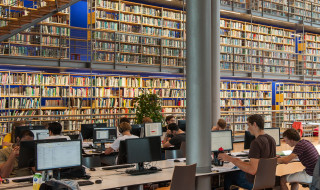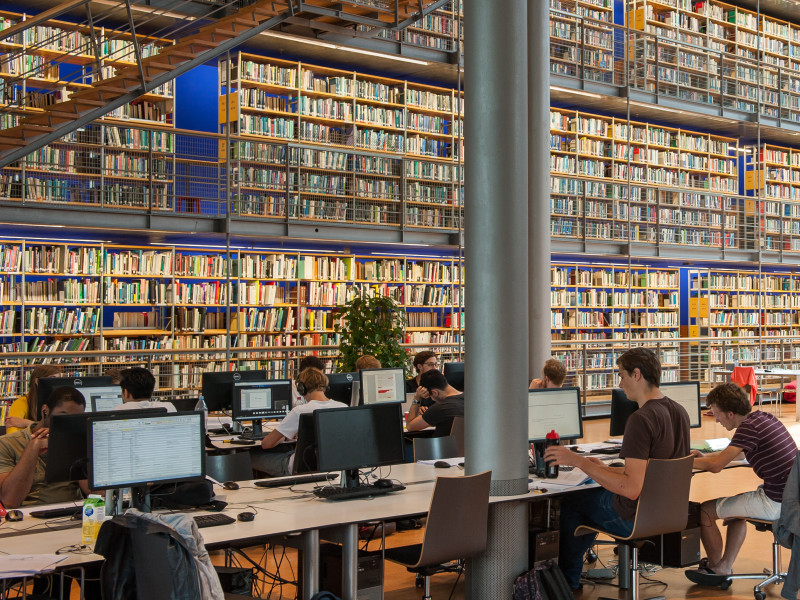In research land, a top-down approach almost always goes wrong'.
Data competence centres connect people and technology
How do you make sure that scientists don't get lost while collecting, storing and processing research data? That is what new Data Competence Centres are designed to do. After an initial exploration, it is clear how institutions approach this.
What is the similarity between research into fish biodiversity, how strong a material is and how people pronounce certain words? At first glance, not much, but all these studies involve the collection of data. Of course, scientists know best how to research. But how best to store this data according to all the regulations is usually less well known to them. That is why plans are currently being made to set up Data Competence Centres (DCCs). In these centres, knowledge institutes combine their expertise of data management and research software. Melle de Vries of KNAW and Peter Hinrich of SURF spoke with representatives of knowledge institutions where the DCCs will be located. De Vries is also an explorer of the national data landscape for the National Program Open Science.
"Everyone understands the importance of data," says De Vries, "but the way in which the DCCs are implemented varies. For example, one knowledge institution is organised more centrally and another more decentrally. That depends on the culture and administrative structure. Sometimes, for example, digital and data knowledge is mainly decentralised and bundled in certain faculties. "Then that knowledge must be shared so that all faculties can benefit from it. It is therefore often important to put an organisational layer on top of this," says Hinrich.
Taking advantage of existing knowledge
Some universities are already well advanced in setting up research support, such as the WUR, which also called this Data Competence Centre. "Others are organising an umbrella network of data specialists at faculties, in order to share knowledge as much as possible," says Hinrich.
There is also a difference in the way data is used. A man of letters who studies books from the eighteenth century applies data differently to someone who works in a biomedical lab. The DCCs will soon have the knowledge of how best to approach the storage and processing of data in various disciplines.
"The DCCs take the institution and the discipline into account," says Hinrich. "Take TU Delft where they do research into nanotechnology. There, developments are much more technology driven and the challenges around data are different." Another example is artificial intelligence. Here, it is important that the quality of the data is high and you have to take into account that researchers are often dependent on other scientists who make their data available. To a certain extent, therefore, a customised approach is needed.
Here, the difference between thematic and local DCCs also emerges. Thematic DCCs are planned across institutions and thus share knowledge broadly within a discipline. "The local DCCs are more clearly identifiable. They are organised at the institutions themselves," says Hinrich. "The thematic variant is less visible now and has yet to be properly arranged by discipline."
Concerns of scientists
What researchers need most, they know themselves. De Vries therefore emphasises the importance of their voice. Are they being heard enough? "In my tour, I noticed that researchers have been spoken to at all institutions," he says. "They are also involved in the DCCs. At the same time, I noticed that the thinking is still quite often supply-driven. Researchers do not want a lot of extra ballast. They are afraid that it will create even more work. That is why they are sometimes not so enthusiastic.
Researchers are often already very busy with teaching, research, administration and applying for grants. "They have no desire for extra work imposed from above," says De Vries. "In research land, a top-down approach almost always goes wrong. So you have to look mainly at what researchers want, with light coordination from the top. What researchers say is guiding, but coordination with other colleagues and disciplines is necessary. Some coordination is therefore indispensable." He understands the concerns of scientists but they are not necessarily necessary, believes De Vries. If the DCCs are handled well, the scientists have less work. "With good support, it saves time. Moreover, it is important that you handle data carefully and the better you do this yourself, the greater the chance that another scientist can make use of your data."

Interpreting 'data' broadly
In recent years, different names were used for the DCCs: Digital or Data Competence Centre. In the end, the majority chose the term Data Competence Centre. The emphasis may therefore seem to lie on the data, but a broad interpretation is necessary, says Hinrich. "With data, archiving, hardware and software play an important role anyway." De Vries agrees, but welcomes the use of the name 'data'. "Otherwise there is a chance that it becomes a party for IT people and the researchers have the idea that it is too far from their bed. Data, on the other hand, has a lot to do with them." The knowledge about organising data competence is in the hands of the professionals in the institutions. The National Coordination Point for Research Data Management (LCRDM) brings them together in a network of expertise. SURF plays a key role in this, according to Hinrich. "As a knowledge distributor, we focus primarily on services and innovation. Data must be universally findable and accessible, but also reusable across the borders of institutions and countries. We want to connect the DCCs with each other, both technically and humanly through a network. To make knowledge available to everyone."
Text: Robert Visscher
Photo: Sicco van Grieken
Translation: Deepl
Data competence centres connect people and technology' is an article from SURF Magazine
